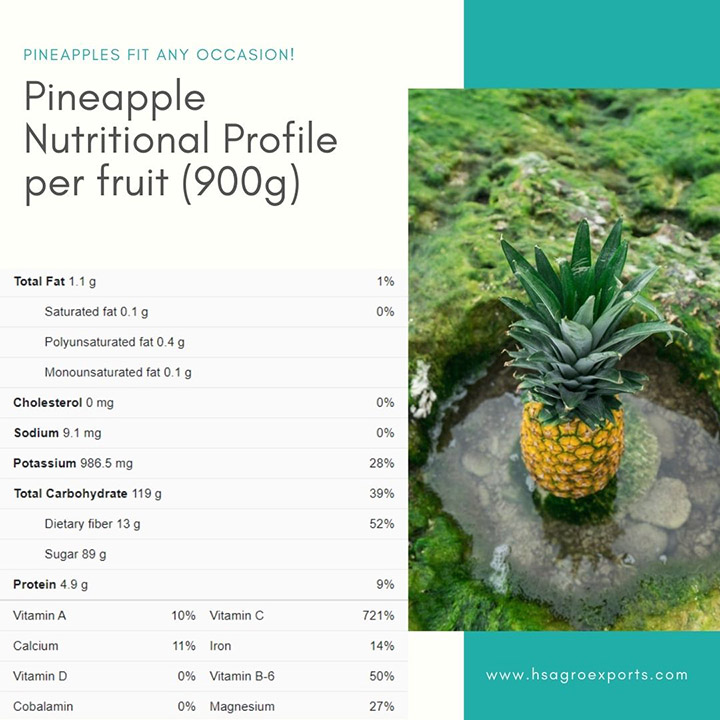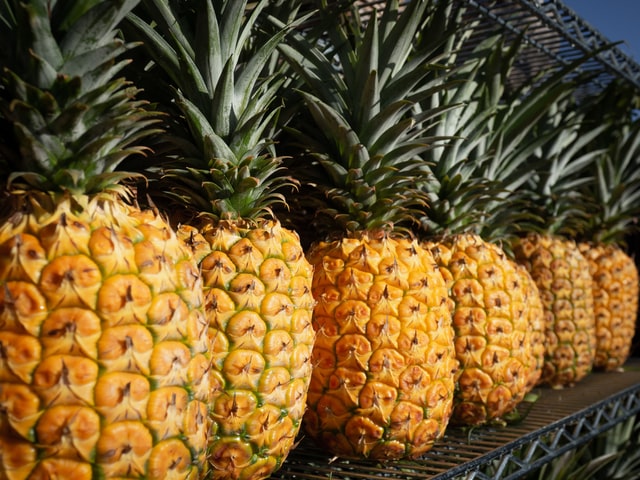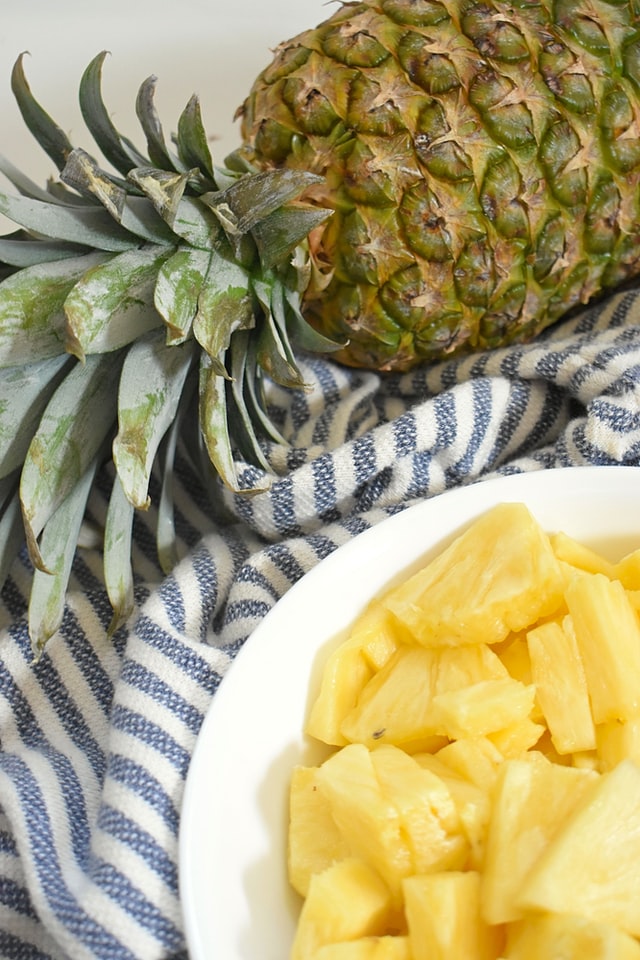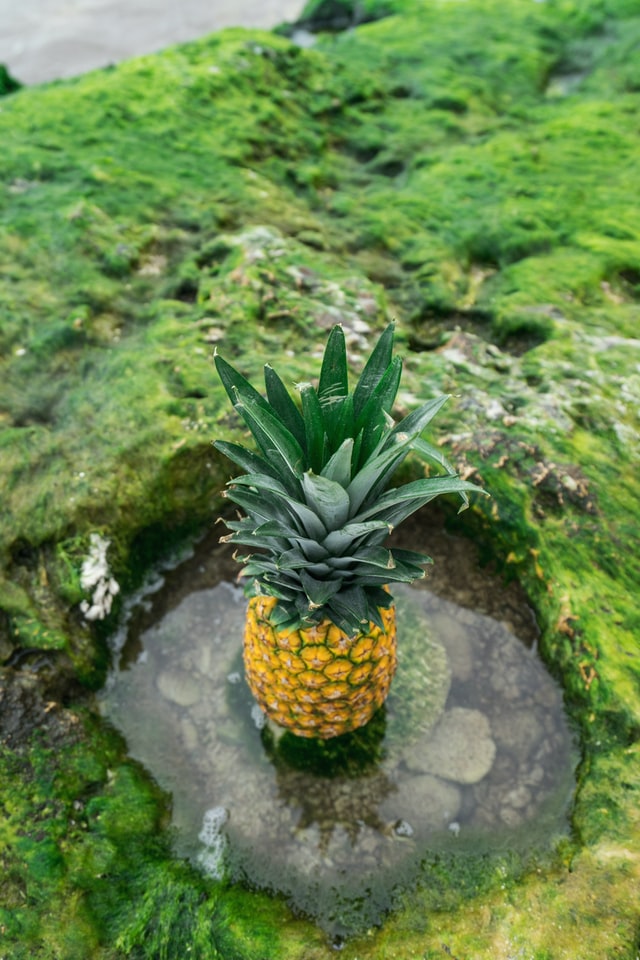Dehydrated Pineapple
Pineapple Cultivation in Sri Lanka
The "Pearl of the Indian Ocean" is home to three varieties of the pineapple fruit - the stout fruit, the red-striped leaf variety and the very sweet Mauritius veriety. It is safe to assume that around 90 percent of Sri Lanka's pineapples hail from the coconut triangle region - Kurunegala, Gampaha, and Puttalam. In addition, Colombo is also known for pineapples. In Sri Lanka, pineapple is one of the most common inter-crops.
The pineapple plants mostly thrive in the low country wet as well as intermediate zones of the island nation. Well-drained deep soil and gravel soils favour pineapple cultivation. Temperatures of approximately 24 degrees Celcius is considered by growers to be optimal for pineapples and this temperature is what is experienced in the Western Province of Sri Lanka. However, it should be noted that if the elevation is high, the pineapples would be more acidic.
Infographic on Pineapples

Health Benefits of Nutritional Dehydrated Pineapples
Pineapples (Ananas comosus) are an incredibly delicious tropical fruit, which hasan exceptional juiciness, vibrant tropical flavor, and immense health benefits. It is the leading edible member of the family Bromeliaceae with the credit of ‘Queen of fruits’ due to its excellent flavor and taste.
Pineapples contain ~81.2 to 86.2% moisture and 13-19% total solids with sucrose, glucose, and fructose as main components. Edible portion of pineapples contain a considerable amount of minerals, vitamins, enzymes, fiber, and carbohydrates with minimal fat and cholesterol.
Impressively, less energy-consuming osmotic dehydration techniques have achieved the higher nutrient retention along with satisfied sensory protection and less microbial attraction. As an excellent source of vitamins, vitamin C or ascorbic acids. Vitamin C, a powerful water-soluble antioxidant supports fighting against cancer cells including colon, esophagus, and stomach by acting against free radicals.
Vitamin C, support boosting the immune system and enhance the formation of collagen in bones, blood vessels, cartilage, and muscle, as well as increase the absorption of iron. Plenty of vitamin C in pineapples helps to maintain the eye fluid and prevent the breakdown that leads to cataracts. Beta carotene is another rich antioxidant in pineapples that showed signs of a reduced risk of certain maladies.
Pineapples are also a good source of vitamin A, B1, B2, B3, and B6. Thiamin (vitamin B1) acts as a cofactor in enzymatic reactions central to energy production. Malic acids in pineapples play a vital role in boosting immunity; promoting smooth, firm skin; helping to maintain oral health; and is said to be active in reducing the risk of toxic metal poisoning.
Several essential minerals exist in pineapples, including manganese, copper, iron, calcium, potassium, and phosphorusplay a major role in growth and development. The trace mineral manganese is an essential cofactor in a number of enzymes important in energy production and antioxidant defenses and needed for the body to build bone and connective tissues.
High manganese content in pineapple is a good choice boosting fertility through sperm quality. Pineapple is a digestive aid and a natural anti-inflammatory fruit. It contains a proteolytic enzyme bromelain, which digests food by breaking down protein. Bromelain also reduces inflammatory immune cells, called cytokines that damage the digestive tract lining. It reduces the swelling in inflammatory conditions such as acute sinusitis, sore throat, and arthritis.
Carbohydrate represents 85% of total solids while fiber makes up for 2-3 %. Fiber in pineapple helps to maintain the health of the gastrointestinal tract by preventing constipation and regularises the intestinal flora. Even though pineapples have low calories it has an impressive nutrient profile with incredible anticancer and anti-inflammatory effects.


